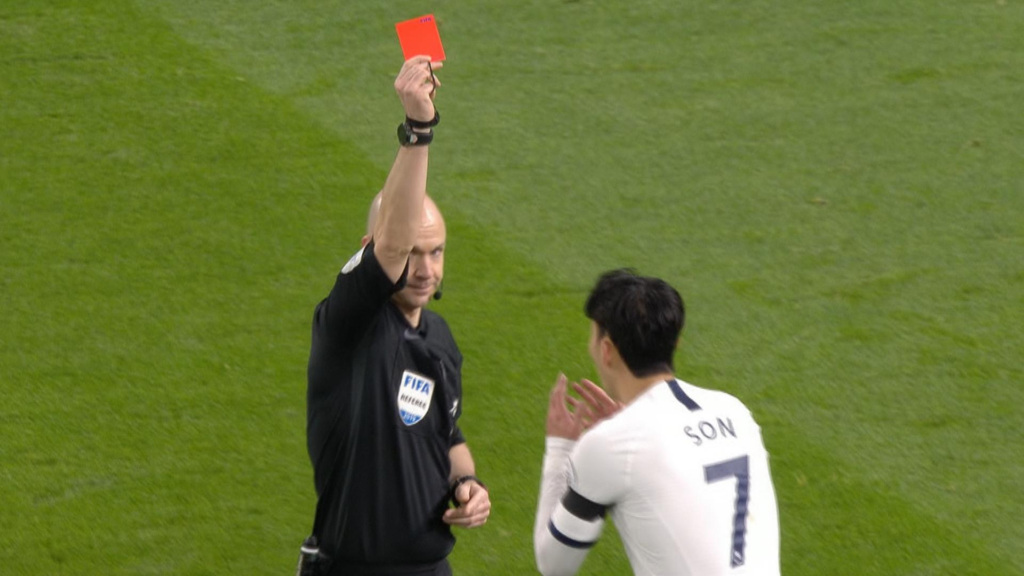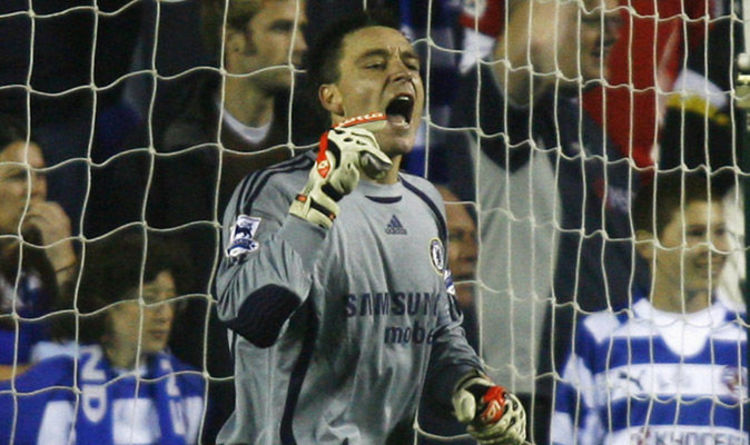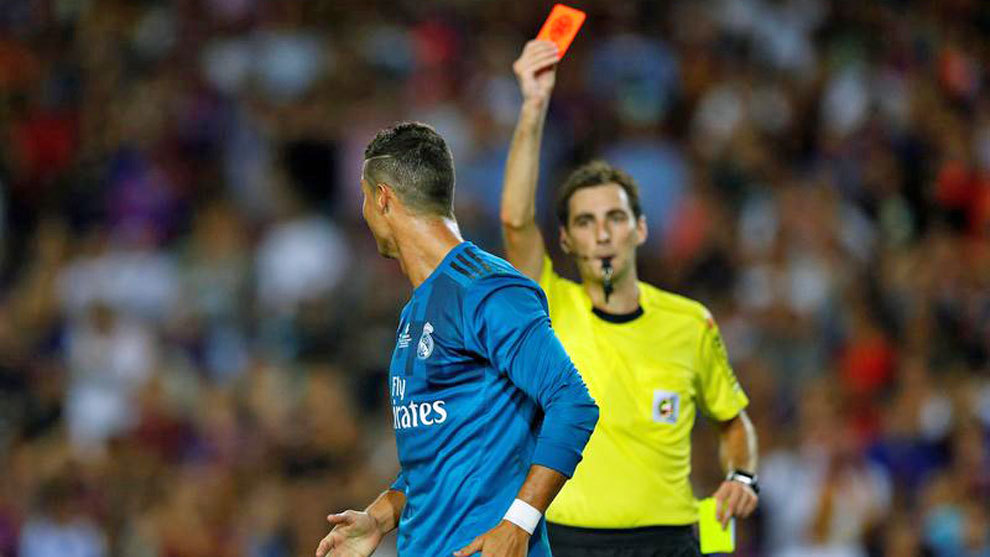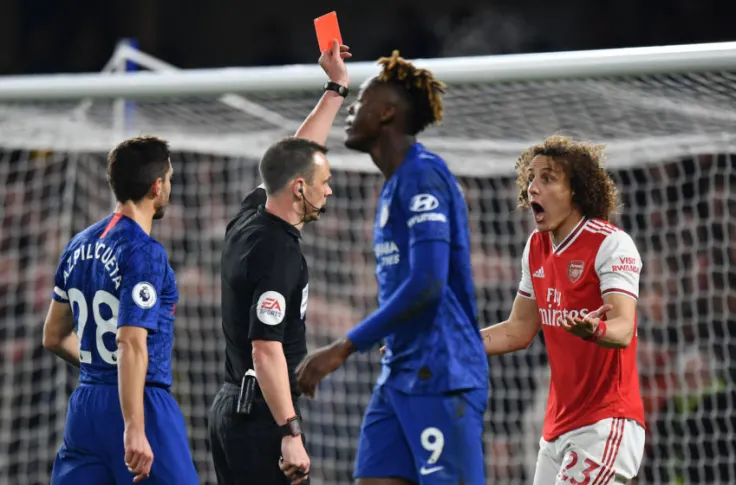A Premier League match is on a knife-edge. A player of one team makes a reckless or dangerous challenge on a player of the opposing team and the referee brandishes a red card to the player. The video assistant referee (VAR) chats into the earpiece of the referee who indicates that VAR is checking the referee’s decision as this is a very important decision in the course of this football match. VAR was introduced to the Premier League in 2019 to review “clear and obvious errors” during matches concerning goals, penalties, straight red cards, and mistaken identity. VAR will review the decision based on the “clear and obvious error” rule and either uphold the referee’s decision or overrule it. If upheld, the decision will give a significant advantage to the team against which the foul had been committed.
What happens if a player receives a Red Card? A red card is shown by a referee to signify that a player has been sent off who has committed a serious offense such as violent conduct or an illegal and purposeful obstruction of a goal-scoring opportunity for the opposing team.
A player who is shown a red card is immediately removed from the field and is ruled ineligible to play for the remainder of the game. They will also be suspended starting with the next game that the team plays or up to three games depending on the severity of the offence. This puts the team in a much weaker position since it is reduced to 10 men on the field, giving the opposing team an advantage.
How many games do players miss because they were given a red card?
The regulations of the event differ, but yellow and red cards are followed by suspensions. In general, a single red card results in an instant suspension of one to three games, with the severity of the punishment depending on the degree of aggression in the specific incident.

Furthermore, depending on the league or competition, receiving a high amount of yellow cards during the season may result in a suspension for that player for a certain number of games, depending on the rules and regulations of that particular league.
If a player commits any of the following offenses, they will get a red card:
- are aggressive in their actions
- spits on a person
- Purposefully handles the ball thereby denying the other team a goal or a clear scoring opportunity.
- By committing a free kick or penalty kick infraction, a player may prevent an opponent from moving towards the player’s goal a clear goalscoring opportunity.
- employ obscene, insulting, or abusive words or gestures
- in the same game, get a second yellow card
What happens if a goalkeeper gets dismissed?
When a goalkeeper is given a red card, the team is then reduced to 10 players, requiring them to replace the goalkeeper that has been sent off and hence having to re-arrange the structure of their team, as one of the outfielders would have to be sacrificed to bring on the team’s reserve goalkeeper as a substitute.

However, if the team has utilized all three of its substitute goalkeepers by the time the goalkeeper is sent off, the manager must choose one of the outfield players to act as the interim shot-stopper. It’s not an ideal scenario, but it’s occurred before. When Premier League giants Liverpool’s Pepe Reina was sent off against Newcastle in 2012, the Reds had exhausted all of their replacements, requiring defender Jose Enrique to play in goal for the remainder of the game. The same scenario would apply if a sending-off occurs to an outfield player, as another outfield player would have to be sacrificed to bring on a substitute to replace the player that has been red-carded. This instance is very common when a defender is given their marching orders by the referee.
Yellow Cards – Two in a single game is an automatic Red
A yellow card here and there may not seem to be a significant disciplinary infraction, but players may be punished if they get too many warnings. Football requires discipline, and referees punish players for any violations or transgressions that occur on the pitch. A yellow card is issued as a warning, enabling a player to remain on the field for the rest of the game, while a red card results in immediate ejection from the field of play.

The kinds of offenses and misbehavior that may result in caution are listed in Law 12 of the Laws of the Game. If a player commits one of the following offenses, he or she will be warned and given a yellow card:
- Disagreement expressed orally or in writing
- Persistent violation of the game’s rules
- Postponing the resumption of play
- Failure to maintain the necessary distance while restarting play with a corner kick, throw-in, or free-kick
- Entering or re-entering the field of play without the consent of the referee
- Deliberately leaving the field of play without the consent of the referee
- Unsportsmanlike conduct (a broad category of caution-worthy acts, see below)
In matches utilizing the Video Assistant Referee system, there are two offenses:
- Entering the referee review area
- The player using the ‘review’ (TV screen) signal excessively
- Unsporting behavior
- These include trying to score by touching the ball or simulating a goal to mislead the referee.
- Fouls committed carelessly or to break up a promising attack are also deemed unsporting behavior and are punished with a yellow card.
- Fouls committed with excessive force, or with the intent of depriving the fouled player of an evident goalscoring chance (i.e. a professional foul), are punished by a red card.
- Removing one’s shirt especially when that player has scored a goal.
However, if a player is cautioned twice with two yellow cards in a game, they are immediately handed a red card. The objective is obviously to avoid getting warnings and red cards, but if they accumulate too many yellow cards over the course of a season, a suspension from playing in matches may ensue.
The accumulation of a specific number of yellow cards over many matches in most competitions leads to the offending player being suspended for a certain number of future matches, with the precise number of cards and matches varying by jurisdiction.

In the UEFA Champions League, for example, receiving two yellow cards during a match will result in a one-game ban. In such cases, players are often accused of (and occasionally confessed to) purposefully earning a second booking in a tournament when the next game is unimportant, thus resetting their yellow card count to zero for future games (known as “cleaning cards”). While legally within the rules of the tournament, this is deemed unsportsmanlike, and UEFA has threatened extra penalties and/or bans to the players and coaches involved in such instances.
The Premier League never fails to entertain. Matches are played at breakneck speed with players giving 100% in every match. Sometimes a tackle is mistimed or a player has a lapse of judgment resulting in a yellow and sometimes red card. However, the game continues, the player serves his suspension and we the supporters always continue watching.
